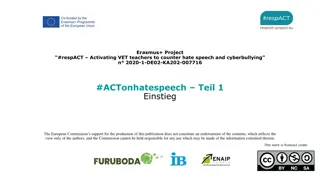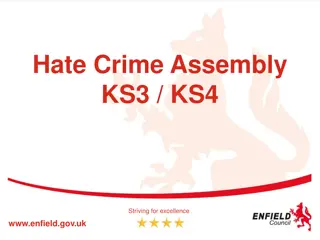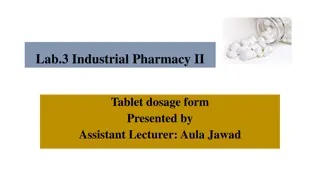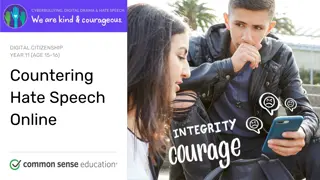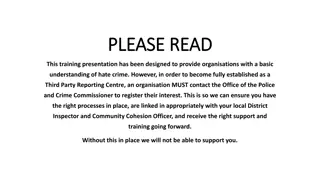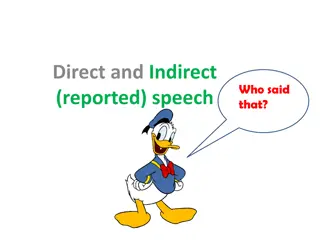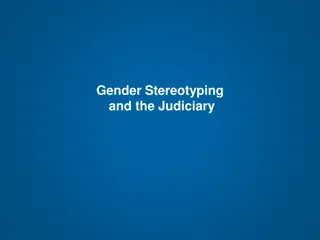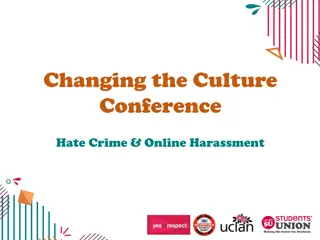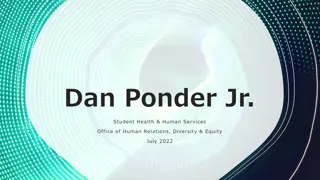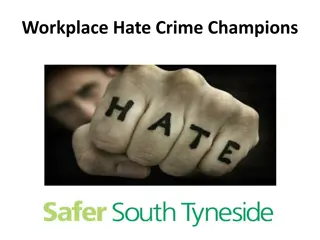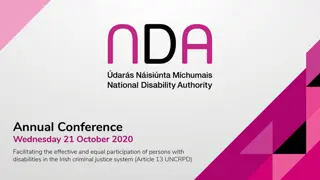Gender-Based Hate Speech & Cyberviolence Against Women: State of Play & Recommendations
The European Women's Lobby (EWL) advocates for combating violence against women & girls, emphasizing online VAWG & the implementation of relevant directives. Key findings underscore online violence as a gendered reality perpetuating inequality.
Download Presentation

Please find below an Image/Link to download the presentation.
The content on the website is provided AS IS for your information and personal use only. It may not be sold, licensed, or shared on other websites without obtaining consent from the author.If you encounter any issues during the download, it is possible that the publisher has removed the file from their server.
You are allowed to download the files provided on this website for personal or commercial use, subject to the condition that they are used lawfully. All files are the property of their respective owners.
The content on the website is provided AS IS for your information and personal use only. It may not be sold, licensed, or shared on other websites without obtaining consent from the author.
E N D
Presentation Transcript
Gender-based hate speech and cyberviolence against women State of play at the EU level and EWL s recommendations
Agenda Introduction of EWL State of play at EU level Recommendations Q&A
European Womens Lobby (EWL) Largest Umbrella Organisation of Women s Civil Society in Europe 31 National Coordinations 17 European-wide member organisations Representing over 2000 member organisations Bringing together the women s movement in Europe to influence the general public and EU institutions in support of women s rights and equality between women and men Over 30 years of presence in Europe Striving to achieve a feminist Europe
EWLs Work on combating violence against women and girls (VAWG) EWL Observatory on VAWG Key issue: Implementation of COM Proposal for a Directive on Violence against women and domestic violence Ratification and Implementation of Istanbul Convention in all EU Member states and beyond Specific focus on online VAWG with trainings like #HNHR
What is gender-based violence against women? any act of gender-based violence against women that is committed, assisted or aggravated in part or fully by the use of ICT, such as mobile phones and smartphones, the Internet, social media platforms or email, against a woman because she is a woman, or affects women disproportionately. UN Special Rapperteur on Violence against women, it's causes and consequences
Key findings of #Her Net Her Rights report Report key findings: 1. Online Violence Against Women and Girls (VAWG) is a reality: it is a gendered and prevalent phenomenon. Online Violence Against Women and Girls is part of the continuum of male violence, impacts on all women and perpetuates gender inequality. Affects women in intersections, such as BIPOC women and women with disabilities disproportionatelly. Understanding the root causes of online VAWG to take action and eradicate it. 2. 3.
Statistics on Cyberviolence against women The recent 2021 EP study estimates that 4 to 7 % of women in the EU-27 have experienced cyber harassment during the past 12 months, while between 1 and 3 % have experienced cyber stalking. - Violence against women online and facilitated by technology: research/surveys Plan International: Free to be online? (2020) Highlights the experiences of 14000 girls worldwide: - - 58% of girls experienced online harassment 50% said they experience more online harassment than street harassment Amnesty International survey on women's experiences of abuse and harassment on social media (2017): - 46% of women responding to the survey who had experienced online abuse or harassment said it was misogynistic or sexist in nature 36% of women in the UK said it made them feel that their physical safety was threatened - European Union Fundamental Rights Survey on Violence against Women (2014): - 20% of young women in the European Union had experienced some form of cyber sexual harassment
Recommended Actions Prevent, Protect & Prosecute
Prevention Need for feminist sexuality education, including education on love and equal relationships, in education programmes to challenge harmful and sexist behaviour and sexist and gender stereotypes. Male violence against women starts with boy s violence against girls and has to be targeted comprehensively in a trauma-, child- and gender-sensitive manner Awareness of the definition of gender-based cyberviolence Training for teachers, law enforcements authorities etc. Investment in education!
Protection - - Continued and hamonised data collection on cyber violence Digital literacy especially for women and girls with special attention to safety features on social media platforms Accountability of platforms - continued improvement of safety features plus legislation on illegal (and harmful) content -
Prosecution - - Harmonised criminalisation of gender-based cyberviolence Functioning law enforcement and knowledge on the enforcement of specific laws Accessibility when it comes to reporting cyberviolence Awareness of the cross-border implications - -
Needed EU Legislation 1. Add VAWG/GBV to the list of Eurocrimes Article 83(1) TFEU 2. Accept COM Proposal to add hate speech and hate crime to the list of Eurocrimes Article 83(1) TFEU, open door to legislation on e.g. sexist, mysogynist, homophobic hate speech/crime 3. Improve and implement the COM Proposal for a Directive on violence against women and domestic violence including the provision on cyber stalking, cyber harassment, non-consensual sharing of intimate or manipulated images and cyber incitement to violence or hatred 4. Seek harmonisation of existing EU legislative instruments, as the Victims Rights Directive, the Anti-Trafficking Directive, the Child Sexual Exploitation and Pornography Directive, relevant provisions of the Digital Services Act and any upcoming legislation on hate speech and crime 5. PLUS: Ratify and implement Istanbul Convention in all EU members states
Are you aware of any best practices in prevention, protection or prosecution nationally?
How do you see the role of Civil Society when it comes to gender-based cyber violence?
Thank you! FACEBOOK @EuropeanWomen INSTAGRAM @EuropeanWomenLobby TWITTER @EuropeanWomen
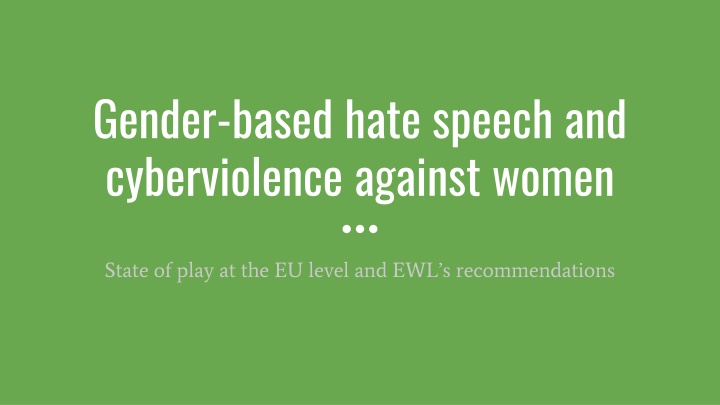

![Prevention and Combating of Hate Crimes and Hate Speech Bill [B.9B.2018]](/thumb/60513/prevention-and-combating-of-hate-crimes-and-hate-speech-bill-b-9b-2018.jpg)
